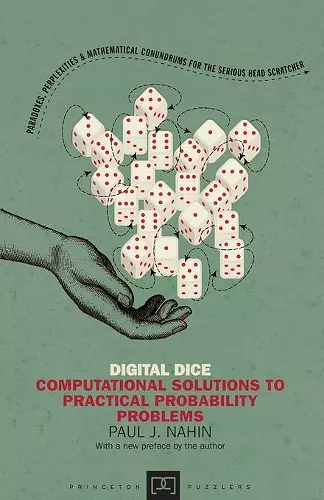Digital Dice
Computational Solutions to Practical Probability Problems
Format:Paperback
Publisher:Princeton University Press
Published:5th Apr '13
Currently unavailable, and unfortunately no date known when it will be back

Some probability problems are so difficult that they stump the smartest mathematicians. But even the hardest of these problems can often be solved with a computer and a Monte Carlo simulation, in which a random-number generator simulates a physical process, such as a million rolls of a pair of dice. This is what Digital Dice is all about: how to get numerical answers to difficult probability problems without having to solve complicated mathematical equations. Popular-math writer Paul Nahin challenges readers to solve twenty-one difficult but fun problems, from determining the odds of coin-flipping games to figuring out the behavior of elevators. Problems build from relatively easy (deciding whether a dishwasher who breaks most of the dishes at a restaurant during a given week is clumsy or just the victim of randomness) to the very difficult (tackling branching processes of the kind that had to be solved by Manhattan Project mathematician Stanislaw Ulam). In his characteristic style, Nahin brings the problems to life with interesting and odd historical anecdotes. Readers learn, for example, not just how to determine the optimal stopping point in any selection process but that astronomer Johannes Kepler selected his second wife by interviewing eleven women. The book shows readers how to write elementary computer codes using any common programming language, and provides solutions and line-by-line walk-throughs of a MATLAB code for each problem. Digital Dice will appeal to anyone who enjoys popular math or computer science. In a new preface, Nahin wittily addresses some of the responses he received to the first edition.
"The problems are accessible but still realistic enough to be engaging, and the solutions in the back of the book will get you through any sticky spots. Writing your own versions of a few of these programs will acquaint you with a useful approach to problem solving and a novel style of thinking."--Brian Hayes, American Scientist "Digital Dice will appeal to recreational mathematicians who have even a limited knowledge of computer programming, and even nonprogrammers will find most of the problems entertaining to ponder."--Games Magazine "[An] enjoyable read, as [Nahin] writes clearly, with humour and is not afraid to include equations where necessary. Nahin spices the book throughout with factual and anecdotal snippets. Digital Dice will appeal to all who like recreational mathematics."--Alan Stevens, Mathematics Today "[T]he book is targeted at teachers and students of probability theory or computer science, as well as aficionados of recreational mathematics, but anyone who is familiar with the basics of probability and is capable of writing simple computer programs will have no problem working their way through this interesting and rewarding book."--Physics World "After the appearance of the author's earlier book on probability problems, [Duelling Idiots And Other Probability Puzzlers], one has high expectations for this book, and one is not disappointed... The book will certainly have great appeal to all three of the targeted audiences."--G A. Hewer, Mathematical Reviews "This well-written entertaining collection of twenty-one probability problems presents their origin and history as well as their computer solutions... These problems could be used in a computer programming course or a probability course that includes Monte Carlo simulations."--Thomas Sonnabend, Mathematics Teacher "All of the books by Nahin and Havil are worth having, including others not listed here. I particularly recommend Digital Dice for the task of teaching undergraduates in mathematics the fundamentals of computation and simulation."--James M. Cargal, The UMAP Journal
ISBN: 9780691158211
Dimensions: unknown
Weight: 255g
288 pages
Revised edition